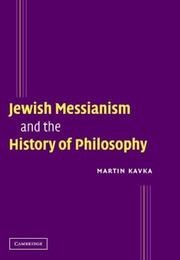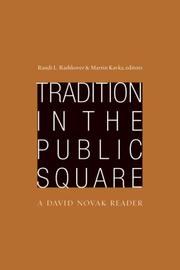| Listing 1 - 10 of 12 | << page >> |
Sort by
|

ISBN: 9780521104630 9780521831031 9780511499098 Year: 2009 Publisher: Cambridge Cambridge University Press
Abstract | Keywords | Export | Availability | Bookmark
 Loading...
Loading...Choose an application
- Reference Manager
- EndNote
- RefWorks (Direct export to RefWorks)
Philosophy --- Néant (philosophie) --- Philosophie juive --- Messie --- Aspect religieux --- Histoire --- Judaïsme

ISBN: 0521831032 0511193882 9780511193880 9780521831031 051119594X 9780511195945 0511195281 9780511195280 9780521104630 0521104637 1280477865 9781280477867 0511314302 9780511314308 0511499094 9780511499098 0511194625 9780511194627 1107148383 0511193181 9781107148383 9780511193187 Year: 2004 Publisher: Cambridge Cambridge University press
Abstract | Keywords | Export | Availability | Bookmark
 Loading...
Loading...Choose an application
- Reference Manager
- EndNote
- RefWorks (Direct export to RefWorks)
Jewish Messianism and the History of Philosophy contests the ancient opposition between Athens and Jerusalem by retrieving the concept of meontology - the doctrine of nonbeing - from the Jewish philosophical and theological tradition. For Emmanuel Levinas, as well as for Franz Rosenzweig, Hermann Cohen and Moses Maimonides, the Greek concept of nonbeing (understood as both lack and possibility) clarifies the meaning of Jewish life. These thinkers of 'Jerusalem' use 'Athens' for Jewish ends, justifying Jewish anticipation of a future messianic era as well as portraying the subjects intellectual and ethical acts as central in accomplishing redemption. This book envisions Jewish thought as an expression of the intimate relationship between Athens and Jerusalem. It also offers new readings of important figures in contemporary Continental philosophy, critiquing previous arguments about the role of lived religion in the thought of Jacques Derrida, the role of Plato in the thought of Emmanuel Levinas and the centrality of ethics in the thought of Franz Rosenzweig.
Jewish philosophy --- Messiah --- Nonbeing --- Philosophy --- Non-being --- Nothing (Philosophy) --- Ontology --- Judaism --- History --- Religious aspects&delete& --- Doctrines --- Lévinas, Emmanuel. --- Lévinas, Emmanuel --- Nonbeing. --- Judaism. --- Religious aspects --- History. --- Lévinas, Emmanuel --- Views on nonbeing. --- Lévinas, Emmanuel. --- Arts and Humanities --- Religion --- Levinas, Emmanuel
Book
ISBN: 9780253010322 9780253010278 Year: 2014 Publisher: Bloomington Indiana university press
Abstract | Keywords | Export | Availability | Bookmark
 Loading...
Loading...Choose an application
- Reference Manager
- EndNote
- RefWorks (Direct export to RefWorks)

ISBN: 0802830722 9780802830722 Year: 2008 Publisher: Grand Rapids Eerdmans
Abstract | Keywords | Export | Availability | Bookmark
 Loading...
Loading...Choose an application
- Reference Manager
- EndNote
- RefWorks (Direct export to RefWorks)
Jewish law --- Jewish philosophy --- Judaism --- Rabbinical literature --- Philosophy --- Doctrines --- History and criticism --- Novak, David,
Book
ISBN: 1316183173 1139016539 Year: 2012 Publisher: Cambridge : Cambridge University Press,
Abstract | Keywords | Export | Availability | Bookmark
 Loading...
Loading...Choose an application
- Reference Manager
- EndNote
- RefWorks (Direct export to RefWorks)
The second volume of The Cambridge History of Jewish Philosophy provides a comprehensive overview of Jewish philosophy from the seventeenth century to the present day. Written by a distinguished group of experts in the field, its essays examine how Jewish thinking was modified in its encounter with modern Europe and America and challenge longstanding assumptions about the nature and purpose of modern Jewish philosophy. The volume also treats modern Jewish philosophy's continuities with premodern texts and thinkers, the relationship between philosophy and theology, the ritual and political life of the people of Israel and the ways in which classic modern philosophical categories help or hinder Jewish self-articulation. These essays offer readers a multi-faceted understanding of the Jewish philosophical enterprise in the modern period.
Book

ISBN: 3110373777 3110312581 9783110312584 3110312492 9783110312492 311031259X 9783110312591 9781306570336 1306570336 9783110373776 Year: 2014 Publisher: München Wien
Abstract | Keywords | Export | Availability | Bookmark
 Loading...
Loading...Choose an application
- Reference Manager
- EndNote
- RefWorks (Direct export to RefWorks)
Catastrophic scenarios dominate our contemporary mindset. Catastrophic events and predictions have spurred new interest in re-examining the history of earlier disasters and the social and conceptual resources they have mobilized. The essays gathered in this volume reconsider the history and theory of different catastrophes and their aftermath. The emphasis is on the need to distance this process of reconsideration from previous teleological representations of catastrophes as an endpoint, and to begin considering their "operative" aspects, which unmask the nature of social and political structures. Among the essays in this volume are analyses, by leading scholars in their respective fields, concerning the role of catastrophes in theology, in the history of industrial accidents, in theory of history, in the history of law, in "catastrophe films", in the history of cybernetics, in post-Holocaust discussions of reparations, and in climate change.
Disasters --- Calamities --- Catastrophes --- Curiosities and wonders --- Accidents --- Hazardous geographic environments --- History. --- Social aspects. --- History --- Social aspects --- E-books
Digital

ISBN: 9783110312584 9783110373776 9783110312492 Year: 2014 Publisher: München ;; Wien De Gruyter Oldenbourg
Abstract | Keywords | Export | Availability | Bookmark
 Loading...
Loading...Choose an application
- Reference Manager
- EndNote
- RefWorks (Direct export to RefWorks)
Book

ISBN: 9780823238187 Year: 2009 Publisher: New York, NY
Abstract | Keywords | Export | Availability | Bookmark
 Loading...
Loading...Choose an application
- Reference Manager
- EndNote
- RefWorks (Direct export to RefWorks)
Digital

ISBN: 9780823238187 9780823230877 Year: 2009 Publisher: New York, N.Y. Fordham University Press
Abstract | Keywords | Export | Availability | Bookmark
 Loading...
Loading...Choose an application
- Reference Manager
- EndNote
- RefWorks (Direct export to RefWorks)
Digital

ISBN: 9783110684353 9783110684421 9783110684285 Year: 2020 Publisher: Berlin ;; Boston De Gruyter
Abstract | Keywords | Export | Availability | Bookmark
 Loading...
Loading...Choose an application
- Reference Manager
- EndNote
- RefWorks (Direct export to RefWorks)
| Listing 1 - 10 of 12 | << page >> |
Sort by
|

 Search
Search Feedback
Feedback About UniCat
About UniCat  Help
Help News
News